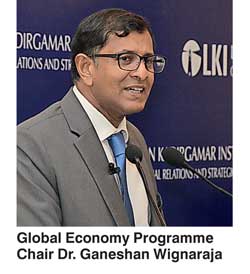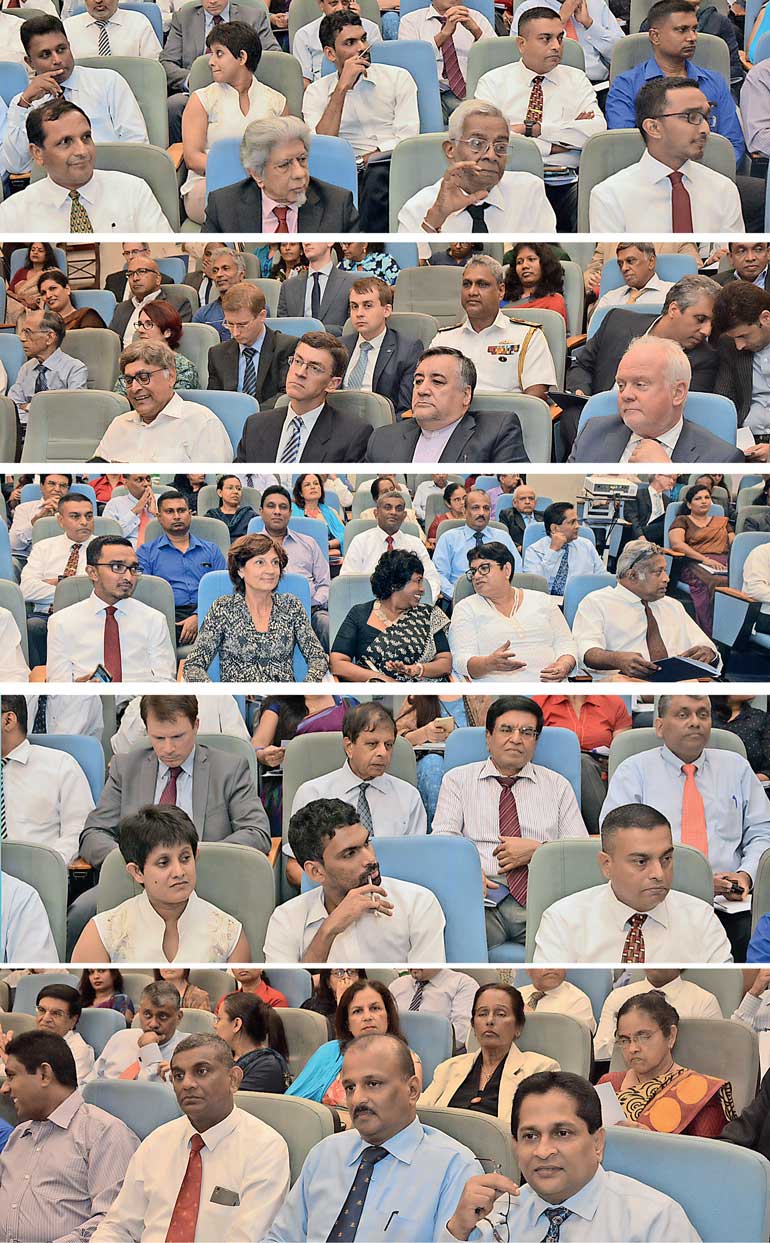Friday Feb 27, 2026
Friday Feb 27, 2026
Thursday, 2 November 2017 00:33 - - {{hitsCtrl.values.hits}}

From left: Global Economy Programme Chair Dr. Ganeshan Wignaraja, National Policies and Economic Affairs Deputy Minister Dr. Harsha De Silva, Former Ambassador Dr. Sarala Fernando, Singapore National University Visiting Senior Research Fellow James Crabtree, Central Bank Governor Dr. Indrajith Coomaraswamy
By Chathuri Dissanayake
The planned free trade agreements with China and India will enable Sri Lanka to reap benefits from projected growth in both countries, a top economist said.
Head of the Global Economy Programme, Lakshman Kadirgamar Institute of International Relations and Strategic Studies, Dr. Ganeshan Wignaraja, delivering his first lecture at the centre on Tuesday, also said that the country should prioritise the FTA with China, predicting a similar agreement with India would materialise “rather quickly for obvious reasons”.
“We should attempt to get these trade agreements, and in terms of sequence for me, I think China is the obvious one. My sense of it is that it is a political agreement not an economic agreement. You don’t negotiate with China if you’re a small country the way we are and China being the large market,” he said.
“It would be an Every Thing but Arms agreement and we should ideally get access for 10 years before China comes and gets access to our market.”
Agreeing with Dr. Wignaraja, Central Bank Governor Dr. Indrajit Coomaraswamy also said that the FTAs which will give preferential access to two of the fastest growing economies in the world would only benefit the country.
Sri Lanka being strategically placed within the Chinese Belt and Road initiative, Coomaraswamy said that the country would only benefit if the trade agreement with China was finalised.
“Being smack-bang in the middle of the Maritime Silk Road is a significant advantage. The Chinese are going to shift billions of dollars through the maritime and land-based routes they have identified for their kind of ‘Marshall Plan Plus’ they have embarked on,” he said.
“The capital they have to recycle and our strategic location means that there is clearly a great opportunity.”
The country’s location will also help reap benefits from India’s growing economy, Coomaraswamy said. As the Indian economy grows and with predictions of one billion entering the middle class and improving infrastructure in both countries, its close proximity to Sri Lanka will yield trade benefits, he said.
The changes in Indian foreign and economic policy have improved market access. Coomaraswamy pointed out that the country could utilise the approach taken through the ‘Make in India’ campaign led by Sri Lanka’s neighbour to plug into the supply chain.
“You look at what happened in East and Southeast Asia when Japan and China grew, a lot of the countries benefited by hooking into the supply chains in Japan and China. South Asia has not had the opportunity. It is possible to replicate what happened in Southeast Asia if the ‘Make in India’ strategy works. The transaction cost in doing business with India will come down.”
Further, new economic regulations implemented by the Modi-led Government through the One Nation One Market approach also makes it easy to carry out business with India, he pointed out.
“A lot of the non-tariff barriers and factors which increased trade costs are likely to come down.”
These benefits are only set to be amplified by the trade agreements to be signed with India, he said.
“ ETCA will not only open up greater scope in terms of the trade in goods that we have under the Indian FTA but will also include services, training and technology and investments,” Coomaraswamy asserted.
However, key to leveraging the opportunity the country has with both nations is how Sri Lanka balances relationships, Deputy Minister of National Policies Harsha de Silva said while speaking at the same event.
“I don’t consider Sri Lanka a South Asian country, but an Indian Ocean country. It becomes very important how we balance. If you look at Sri Lanka as an Indian Ocean country then it becomes very important how we balance China and India; that is our challenge: how we work with both giants and in the process how do we bring up the livings standards of our people and create wealth in Sri Lanka, create jobs, that is our opportunity we need to leverage,” he said.
The Deputy Minister pointed out that it was important to learn a lesson from the South China Sea dispute to ensure that the same was not repeated in the Indian Ocean. Prime Minister Ranil Wickremesinghe has already spoken with Australia and the Sri Lankan Government is exploring the possibility of having a conference by the end of next year.
“We see what’s happening in the South China Sea. True, there’s no real conflict here, things seem peaceful and good. But it’s in our interests also to ensure that if we are to become the centre of the Indian Ocean, we need to ensure the freedom of navigation. Not just military interests but socio-political interests need to be managed in a way which is equitable for all players big and small,” he said.
De Silva pointed out that other countries had already expressed interest and the Government had already appointed a group of experts to explore the matter in depth.
“We are hopeful that we can have some process by the end of next year at least, or some broad consensus on a rules-based order,” he said.
Pix by Upul Abayasekara
